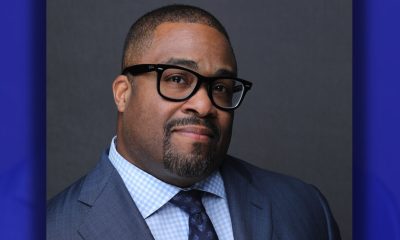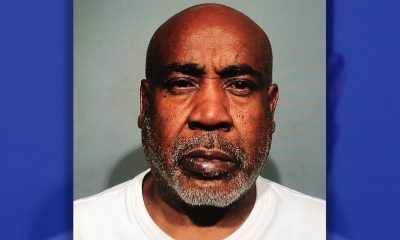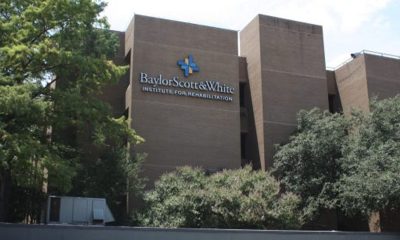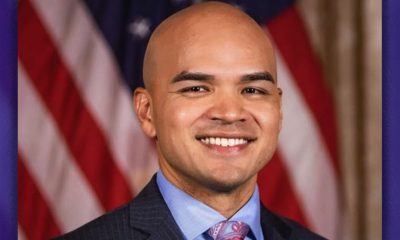Politics
Baltimore Mayor Wins Praise for Seeking Federal Police Probe

Mayor Stephanie Rawlings-Blake holds a news conference on Wednesday, May 6, 2015 in Baltimore. The mayor called on U.S. government investigators to look into whether this city’s beleaguered police department uses a pattern of excessive force or discriminatory policing. Rawlings-Blake’s request came a day after new Attorney General Loretta Lynch visited the city and pledged to improve the police department. (Kim Hairston/The Baltimore Sun via AP)
DAVID DISHNEAU, Associated Press
BALTIMORE (AP) — Baltimore Mayor Stephanie Rawlings-Blake is winning support from other public officials and praise from legal experts for asking the U.S. Justice Department to investigate her police department for discriminatory patterns or practices.
After previously saying she was determined to fix the Baltimore Police Department’s problems herself, the Democratic mayor announced Wednesday that she has asked U.S. Attorney General Loretta Lynch to order a civil-rights investigation.
“We have to have a foundation of trust,” Rawlings-Blake told a news conference. “I believe we need the assistance of the Department of Justice and the civil rights investigation to shore up that foundation that is weak right now in our city.”
Lynch said in written testimony prepared for a U.S. Senate Appropriations subcommittee hearing Thursday that her agency is considering the request and she intends to have a decision “in the coming days.”
She said the city has made significant strides in a voluntary, collaborative reform effort with the Justice Department that began last fall, but “I have not ruled out the possibility that more may need to be done.”
The mayor’s announcement Wednesday came a day after her closed-door meeting at City Hall with Lynch.
The broad investigation, if undertaken by the federal agency, could eventually force the city to make changes under the oversight of an outside monitor.
Rawlings-Blake said she would accept outside intervention to repair fractured relations between the police and the public in a city that was torn by riots over the death of Freddie Gray, a black man who suffered a fatal spinal injury in police custody last month.
Republican Gov. Larry Hogan, Baltimore City Council President Jack Young and the president of the city’s police union were among the public officials saying they welcomed the development.
A key figure who didn’t immediately respond was Police Commissioner Anthony Batts, brought in from Oakland, California, by the mayor 2 1/2 years ago to reform the department.
The mayor’s request could put Batts’ leadership under a microscope. A police spokesman did not respond Thursday to requests for the commissioner’s reaction.
Criminologist Samuel Walker, a professor emeritus at the University of Nebraska-Omaha who has written extensively on civil-rights abuses by police, said a civil-rights investigation is warranted in Baltimore and he expects the Justice Department to launch one.
He said Rawlings-Blake “has to be given credit for having thought about the problem and evidently recognized that the problems are worse than she realized, and this is the proper solution.”
Baltimore suffered days of unrest after Gray died April 19 following a week in a coma after his arrest. Protesters threw bottles and bricks at police the night of his funeral on April 27, injuring nearly 100 officers. More than 200 people were arrested as cars and businesses burned.
Baltimore has been participating in a voluntary Justice Department review, requested by Rawlings-Blake and Batts last fall. It would enable police to implement reforms without a court order or independent monitor.
The Justice Department also is investigating whether Gray’s civil rights were violated, a much narrower review than what Rawlings-Blake sought Wednesday.
Six officers face state charges ranging from assault to second-degree murder in Gray’s death. At least two of them have filed motions challenging the prosecutor’s assertion that Gray was arrested illegally.
The investigation the mayor now wants is a wide-ranging probe, examining how police use force, and search and arrest suspects. A similar investigation followed the shooting of an unarmed, 18-year-old black man by a white police officer in Ferguson, Missouri. The department ultimately concluded that Ferguson’s police and courts engaged in patterns of racial profiling, bigotry and profit-driven law enforcement, and directed local authorities to make changes. Local authorities still insist they did nothing wrong.
___
Associated Press writers Brian Witte and Juliet Linderman in Baltimore and Ben Nuckols and Eric Tucker in Washington contributed to this report.
Copyright 2015 The Associated Press. All rights reserved. This material may not be published, broadcast, rewritten or redistributed.
Bay Area
MAYOR BREED ANNOUNCES $53 MILLION FEDERAL GRANT FOR SAN FRANCISCO’S HOMELESS PROGRAMS
San Francisco, CA – Mayor London N. Breed today announced that the U.S. Department of Housing and Urban Development (HUD) has awarded the city a $53.7 million grant to support efforts to renew and expand critical services and housing for people experiencing homelessness in San Francisco.

FOR IMMEDIATE RELEASE:
Wednesday, January 31, 2024
Contact: Mayor’s Office of Communications, mayorspressoffice@sfgov.org
***PRESS RELEASE***
MAYOR BREED ANNOUNCES $53 MILLION FEDERAL GRANT FOR SAN FRANCISCO’S HOMELESS PROGRAMS
HUD’s Continuum of Care grant will support the City’s range of critical services and programs, including permanent supportive housing, rapid re-housing, and improved access to housing for survivors of domestic violence
San Francisco, CA – Mayor London N. Breed today announced that the U.S. Department of Housing and Urban Development (HUD) has awarded the city a $53.7 million grant to support efforts to renew and expand critical services and housing for people experiencing homelessness in San Francisco.
HUD’s Continuum of Care (CoC) program is designed to support local programs with the goal of ending homelessness for individuals, families, and Transitional Age Youth.
This funding supports the city’s ongoing efforts that have helped more than 15,000 people exit homelessness since 2018 through City programs including direct housing placements and relocation assistance. During that time San Francisco has also increased housing slots by 50%. San Francisco has the most permanent supportive housing of any county in the Bay Area, and the second most slots per capita than any city in the country.
“In San Francisco, we have worked aggressively to increase housing, shelter, and services for people experiencing homelessness, and we are building on these efforts every day,” said Mayor London Breed. “Every day our encampment outreach workers are going out to bring people indoors and our City workers are connecting people to housing and shelter. This support from the federal government is critical and will allow us to serve people in need and address encampments in our neighborhoods.”
The funding towards supporting the renewal projects in San Francisco include financial support for a mix of permanent supportive housing, rapid re-housing, and transitional housing projects. In addition, the CoC award will support Coordinated Entry projects to centralize the City’s various efforts to address homelessness. This includes $2.1 million in funding for the Coordinated Entry system to improve access to housing for youth and survivors of domestic violence.
“This is a good day for San Francisco,” said Shireen McSpadden, executive director of the Department of Homelessness and Supportive Housing. “HUD’s Continuum of Care funding provides vital resources to a diversity of programs and projects that have helped people to stabilize in our community. This funding is a testament to our work and the work of our nonprofit partners.”
The 2024 Continuum of Care Renewal Awards Include:
- $42.2 million for 29 renewal PSH projects that serve chronically homeless, veterans, and youth
- $318,000 for one new PSH project, which will provide 98 affordable homes for low-income seniors in the Richmond District
- $445,00 for one Transitional Housing (TH) project serving youth
- $6.4 million dedicated to four Rapid Rehousing (RRH) projects that serve families, youth, and survivors of domestic violence
- $750,00 for two Homeless Management Information System (HMIS) projects
- $2.1 million for three Coordinated Entry projects that serve families, youth, chronically homeless, and survivors of domestic violence
In addition, the 2023 CoC Planning Grant, now increased to $1,500,000 from $1,250,000, was also approved. Planning grants are submitted non-competitively and may be used to carry out the duties of operating a CoC, such as system evaluation and planning, monitoring, project and system performance improvement, providing trainings, partner collaborations, and conducting the PIT Count.
“We are very appreciative of HUD’s support in fulfilling our funding request for these critically important projects for San Francisco that help so many people trying to exit homelessness,” said Del Seymour, co-chair of the Local Homeless Coordinating Board. “This funding will make a real difference to people seeking services and support in their journey out of homelessness.”
In comparison to last year’s competition, this represents a $770,000 increase in funding, due to a new PSH project that was funded, an increase in some unit type Fair Market Rents (FMRs) and the larger CoC Planning Grant. In a year where more projects had to compete nationally against other communities, this represents a significant increase.
Nationally, HUD awarded nearly $3.16 billion for over 7,000 local homeless housing and service programs including new projects and renewals across the United States.
Activism
Oakland Post: Week of April 17 – 23, 2024
The printed Weekly Edition of the Oakland Post: Week of April 17 – 23, 2024

To enlarge your view of this issue, use the slider, magnifying glass icon or full page icon in the lower right corner of the browser window. ![]()
Barbara Lee
Congresswoman Barbara Lee Issues Statement on Deaths of Humanitarian Aid Volunteers in Gaza
On April 2, a day after an Israeli airstrike erroneously killed seven employees of World Central Kitchen (WCK), a humanitarian organization delivering aid in the Gaza Strip, a statement was release by Rep. Barbara Lee (D-CA-12). “This is a devastating and avoidable tragedy. My prayers go to the families and loved ones of the selfless members of the World Central Kitchen team whose lives were lost,” said Lee.

By California Black Media
On April 2, a day after an Israeli airstrike erroneously killed seven employees of World Central Kitchen (WCK), a humanitarian organization delivering aid in the Gaza Strip, a statement was release by Rep. Barbara Lee (D-CA-12).
“This is a devastating and avoidable tragedy. My prayers go to the families and loved ones of the selfless members of the World Central Kitchen team whose lives were lost,” said Lee.
The same day, it was confirmed by the organization that the humanitarian aid volunteers were killed in a strike carried out by Israel Defense Forces (IDF). Prior to the incident, members of the team had been travelling in two armored vehicles marked with the WCF logo and they had been coordinating their movements with the IDF. The group had successfully delivered 10 tons of humanitarian food in a deconflicted zone when its convoy was struck.
“This is not only an attack against WCK. This is an attack on humanitarian organizations showing up in the direst situations where food is being used as a weapon of war. This is unforgivable,” said Erin Gore, chief executive officer of World Central Kitchen.
The seven victims included a U.S. citizen as well as others from Australia, Poland, the United Kingdom, Canada, and Palestine.
Lee has been a vocal advocate for a ceasefire in Gaza and has supported actions by President Joe Biden to airdrop humanitarian aid in the area.
“Far too many civilians have lost their lives as a result of Benjamin Netanyahu’s reprehensible military offensive. The U.S. must join with our allies and demand an immediate, permanent ceasefire – it’s long overdue,” Lee said.
-

 Activism4 weeks ago
Activism4 weeks agoOakland Post: Week of March 27 – April 2, 2024
-

 #NNPA BlackPress4 weeks ago
#NNPA BlackPress4 weeks agoFrom Raids to Revelations: The Dark Turn in Sean ‘Diddy’ Combs’ Saga
-

 #NNPA BlackPress4 weeks ago
#NNPA BlackPress4 weeks agoCOMMENTARY: D.C. Crime Bill Fails to Address Root Causes of Violence and Incarceration
-

 #NNPA BlackPress4 weeks ago
#NNPA BlackPress4 weeks agoCOMMENTARY: Lady Day and The Lights!
-

 #NNPA BlackPress4 weeks ago
#NNPA BlackPress4 weeks agoMayor, City Council President React to May 31 Closing of Birmingham-Southern College
-

 #NNPA BlackPress4 weeks ago
#NNPA BlackPress4 weeks agoBaltimore Key Bridge Catastrophe: A City’s Heartbreak and a Nation’s Alarm
-

 #NNPA BlackPress4 weeks ago
#NNPA BlackPress4 weeks agoBaltimore’s Key Bridge Struck by Ship, Collapses into Water
-

 #NNPA BlackPress4 weeks ago
#NNPA BlackPress4 weeks agoBeloved Actor and Activist Louis Cameron Gossett Jr. Dies at 87



















































